Filmmaker Karan Johar unspools his 25 years at the movies
Pic/Pradeep Dhivar
 Back when Karan Johar was 15, having just finished his Class X, his mother, Hiroo, received a call from her friend, popular television director Aanand Mahendroo (Dekh Bhai Dekh).
Back when Karan Johar was 15, having just finished his Class X, his mother, Hiroo, received a call from her friend, popular television director Aanand Mahendroo (Dekh Bhai Dekh).
Mahendroo had heard that Hiroo’s son is “extra plus-size,” as Karan puts it, and asked her if he might want to act in his TV show. That’s the sort of “large kid” he was looking for.
Karan was on his summer holidays. He’d only done school-level dramatics. But, why not? He went over from his Malabar Hill home to the far suburbs, to meet Mahendroo, who wasn’t in office. He waited for “four hours, doing nothing”.
Next to him, also waiting in the same room, was a slightly older bloke—sipping tea, engrossed in solving a crossword. No chit-chat or eye-contact. Soon as director Mahendroo entered his office, he spoke to this gentleman first. That conversation lasted hardly a minute.
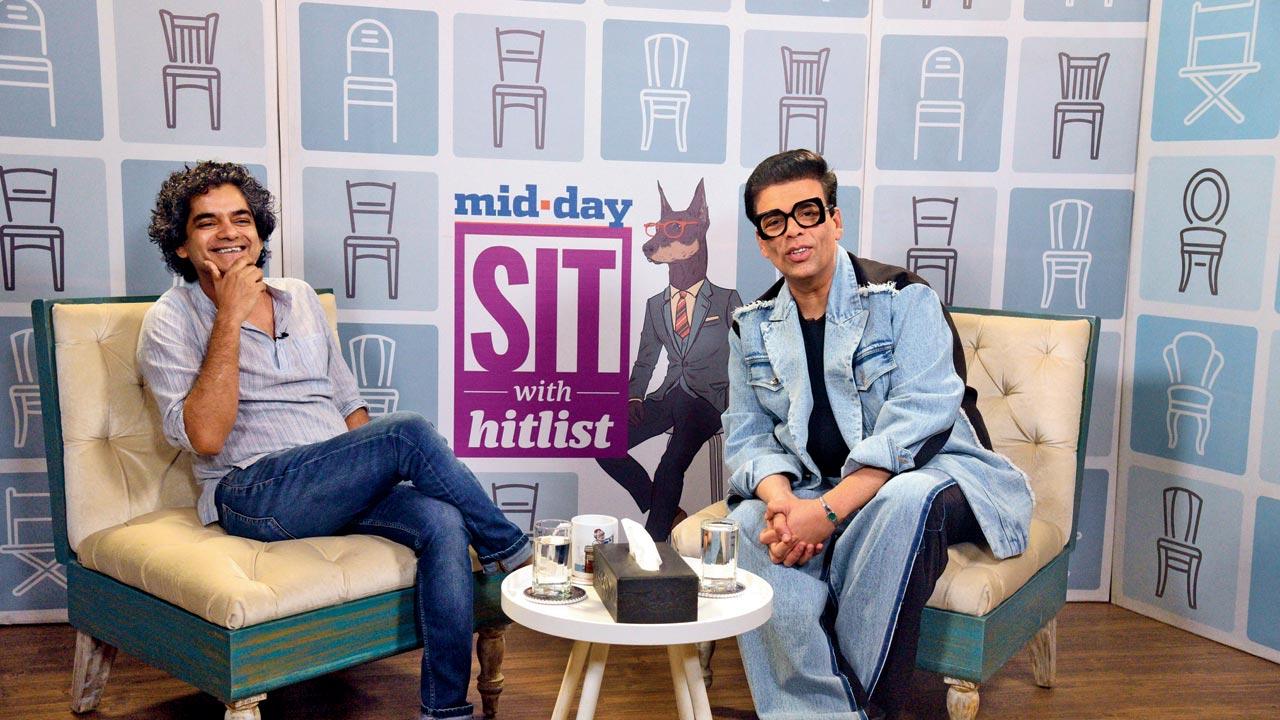 Filmmaker Karan Johar with mid-day’s entertainment editor Mayank Shekhar at the latest edition of Sit with Hitlist. Pics/Aishwarya Deodhar
Filmmaker Karan Johar with mid-day’s entertainment editor Mayank Shekhar at the latest edition of Sit with Hitlist. Pics/Aishwarya Deodhar
Mahendroo offered the person a part in a TV series. The gentleman casually shot back, “No, I don’t want to do TV. I liked the tea. And stayed to finish my crossword!” And he flipped, and left. “Crazy! You know who he was? The actor from Fauji,” Mahendroo told Karan.
Meaning, Shah Rukh Khan (SRK). That’s how Karan met (or did not meet) SRK, first. Mahendroo offered Karan the teenaged part that he had in mind for him.
This involved shooting, for fun, during the holidays, at RK Studio, along with kids his age. The show was the much-loved Indradhanush (1989)—sci-fi, on Sunday Doordarshan, about a group of children, who discover a time machine.
That chubby boy, Srikant, in the group, was how many of a certain vintage would’ve first seen Karan Johar on screen. Only, they don’t remember, or realise it. It’s a legit trivia question. “Yeah, my acting career essentially started with Indradhanush, and ended with Bombay Velvet (2015),” Karan, 51, mock-sighs now.
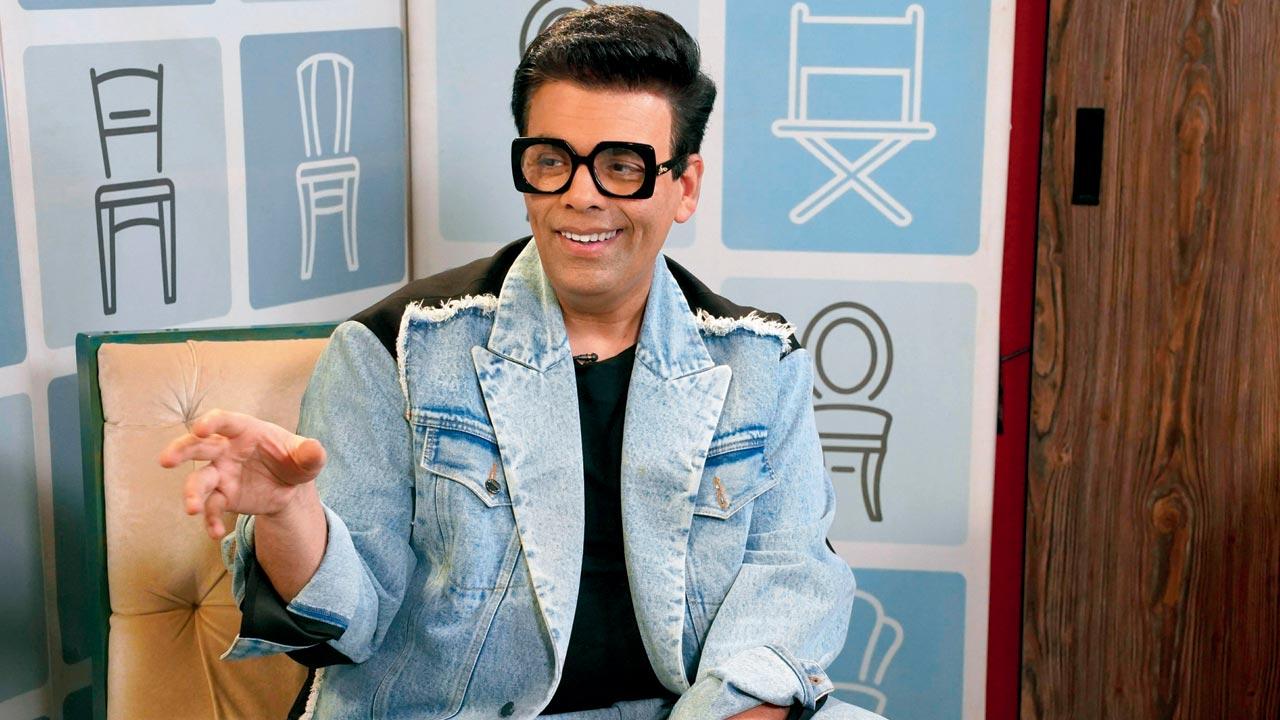
While this was a summer activity for him, Indradhanush came out only a couple of years later. By when, he was already in the final year of junior college (Class XII). Kids randomly started ragging him, once he came on TV.
“Hello? I’m your senior, what’re you ragging me for,” he told them. The other person going through a similar experience in the same junior college was Jugal Hansraj (popular child-actor from Masoom, 1983).
Karan says, “Jugal had done some ad for MBD Books: ‘For me, for you, MBD Books’! Those days, if you borrowed a VHS tape, you’d always see Jugal doing this ad. Him and I got ostracised in college together!”
Since we’re on a trivia trail—besides that they’re friends from college, what’s the pop-culture connect between Jugal and Karan?
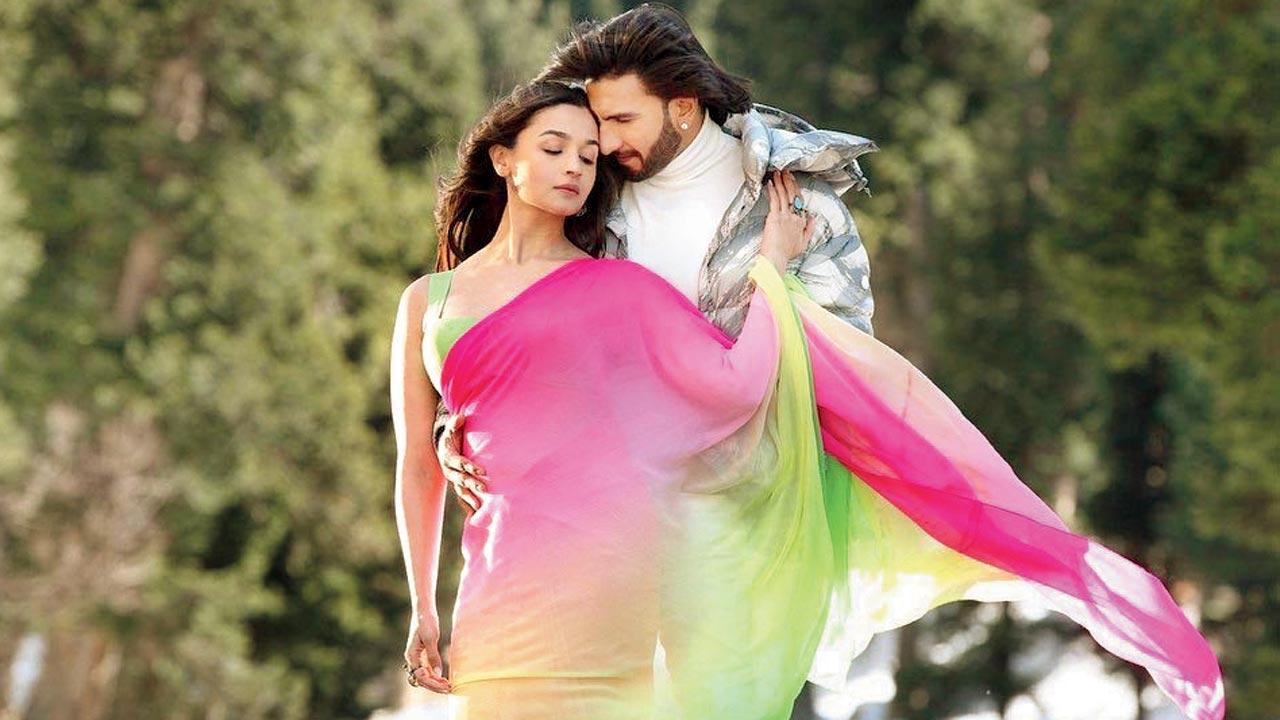 Stills from Rocky Aur Rani Kii Prem Kahaani
Stills from Rocky Aur Rani Kii Prem Kahaani
The hook line of the film’s title-track, Kuch Kuch Hota Hai (KKHH, 1998)? Well, Jugal Hansraj composed that earworm. To the best of our knowledge, he hasn’t composed anything for public consumption since. “He says he chose to retire at the top,” Karan laughs.
The love-triangle, KKHH, that opened in theatres on October 16, 1998, was Karan’s directorial debut, starring SRK. SRK and Karan, as is well-known, became friends, when the latter (22 then) was assisting Aditya Chopra on Dilwale Dulhania Le Jayenge (DDLJ, 1995).
Ever since, Karan’s done multiple films with SRK in the lead, signifying a career combo of sorts—Kabhi Khushi Kabhie Gham (K3G, 2001), Kabhi Alvida Naa Kehna (KANK, 2006), My Name is Khan (MNIK, 2010).
That number crosses way over a dozen, if you factor in co-productions, and SRK’s cameos—including Ae Dil Hai Mushkil (Ae Dil…, 2016), or the colossal Brahmāstra (2022).
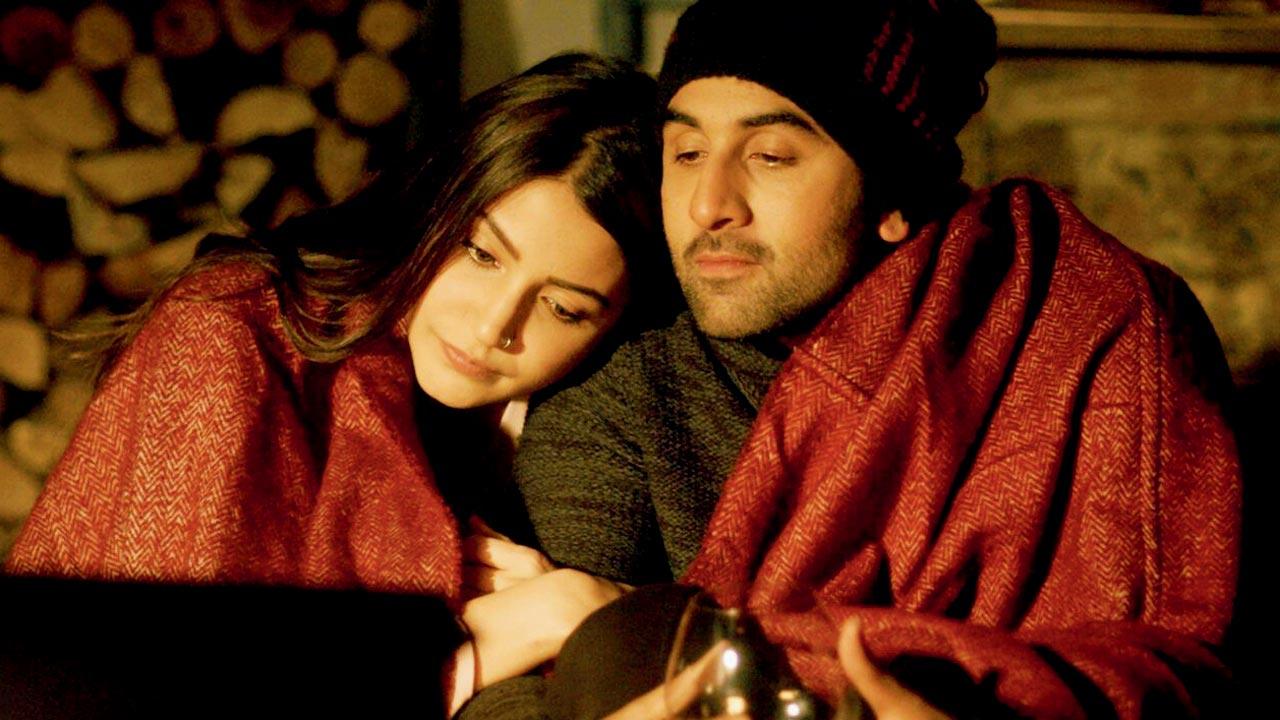 Stills from Ae Dil Hai Mushkil
Stills from Ae Dil Hai Mushkil
Given SRK is arguably the highest paid movie-star in India, I wonder what he charges, when he drops in for a cameo. Karan claims, not a buck: “Not for Ae Dil… Nor for Brahmāstra, for which he shot for 14 days! But that is our relationship.”
Surely, the superstar would have been paid in kind; expensive return gifts, perhaps? A Cadillac, maybe? None of that, or so Karan says: “I give him clothes. I don’t think he has ever asked me for money, even for a film that he has done [as lead].
“Whatever is given, is given. Our contracts with Shah Rukh read: ‘It was a pleasure working with you. Thank you so much!’ That’s the contract. There is no contract!”
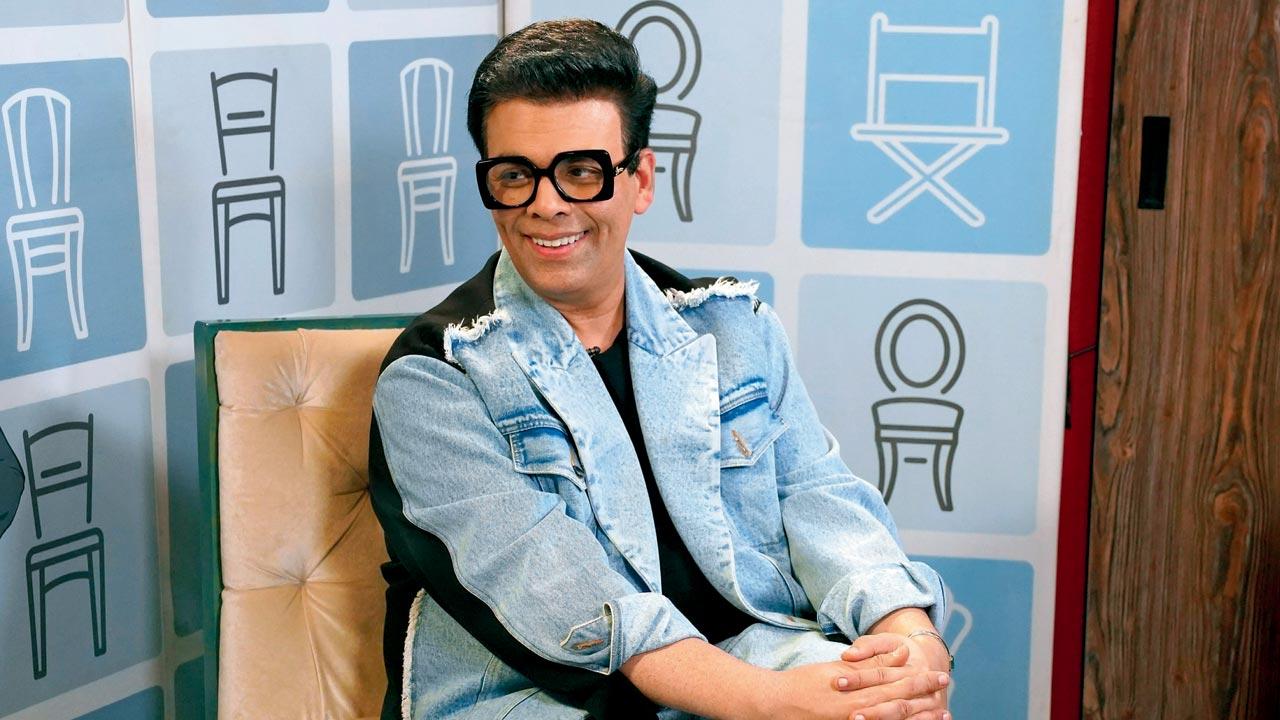
No piece of paper? “I don’t have anything detailed on paper. Whether it is with Adi [Chopra], or Shah Rukh—I will do anything that is asked of me [as well]. I am here, because of them. How can I forget that? Loyalty is the most required quality in a person, and it rarely exists.
“I remember when Shah Rukh was shooting for RA.One [2011], he had a double unit. He called me to shoot [the second unit] for six days, because [director] Anubhav [Sinha] was doing a big action sequence. And he needed simple patch-work kind of scenes shot. I flew from Bombay, and did it. These are not big deals.”
Karan’s latest film, Rocky Aur Rani Kii Prem Kahaani (RARKPK, 2023), was his seventh feature, after a gap of seven years, in his 25th year at the movies as director. He says, “I keep hearing it as a comeback, which makes me sound like Mumtaz, who returned after many years in America [with David Dhawan’s Aandhiyan, 1990]!
“I spent three years on Takht [a film that didn’t work out, apparently for financial reasons]. Maybe, three years went on PTSD [post-traumatic stress disorder].
Another two years on the pandemic. But I’ve always been here.”
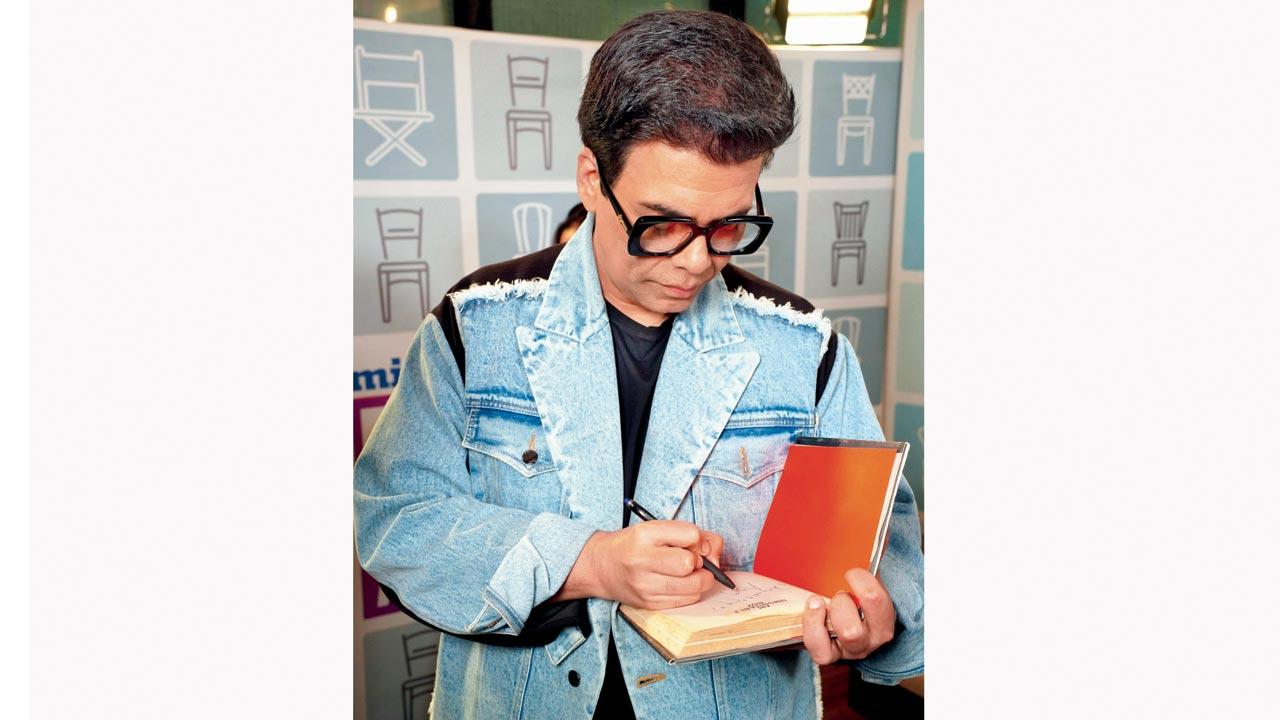
RARKPK is also his first directorial, without SRK in any form (SRK was co-producer on Student of the Year). There are probably also other firsts—such as his maiden movie shot entirely in India? “Yes.” First directorial that’s actually LOL funny? “I think so. There were funny moments in all other movies, but this one is funny up to a large point, and funny even after.”
• • •
Even if you’ve seen the blockbuster, what is RARKPK about? Let’s step back a bit. To start with, about a man, with an artistic bent, born into a business family, where he’s unlikely to succeed, as a result. The family deals in making and selling sweets, in Delhi. That’s Dharmendra’s character, isn’t it?
Only that it’s evidently inspired by Karan’s late father, Yash Johar, when you consider that young Yash was similarly inclined to the arts, i.e. photography.
His family business was based in Delhi. And they made and sold sweets. Just that the company wasn’t called Dhanlakshmi. Karan recalls, “I have no clue why our family shop in Delhi was called Nanking, which is the name of a Chinese restaurant in every Indian town. We sold sweets with that name!”
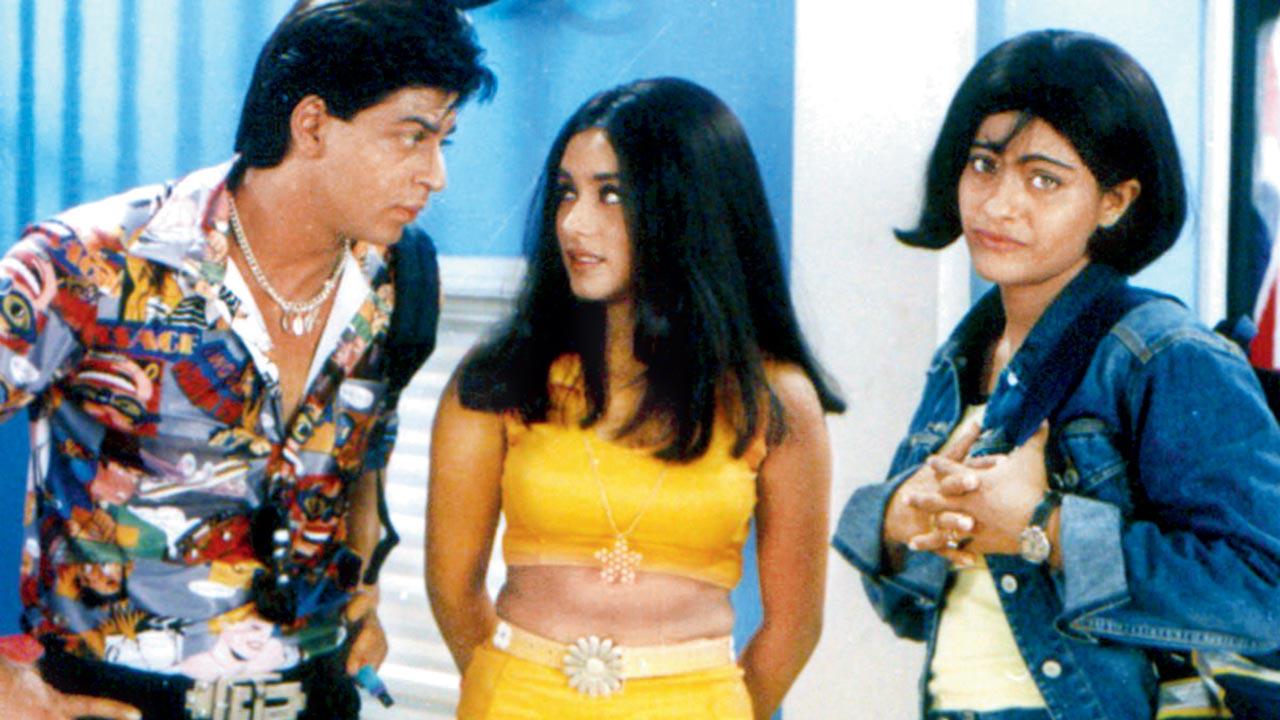 A still of Shah Rukh Khan, Rani Mukerji and Kajol in Kuch Kuch Hota Hai (1998)
A still of Shah Rukh Khan, Rani Mukerji and Kajol in Kuch Kuch Hota Hai (1998)
Upon learning about Yash’s evident lack of interest in the family business, and an artistic ambition instead, his mother, as in Karan’s grandmom—“we called her Mataji”—asked Yash to head to Bombay. Soon as he arrived in Bombay, he landed an internship with The Times of India as a photographer.
“This took him to several sets, like Mughal-e-Azam, and other films,” which is the industry he switched to, working his way up, “starting out as ground manager, then production manager, and eventually, production controller—to working for Navketan Films, for 12 years—and being the only production controller to get front-roll credit.
“Everybody in the film industry knew and loved him: Dev Anand, Vijay Anand, Raj Kapoor, K Asif, Sunil Dutt… Everybody had worked with him.”
Perhaps the insecure/seasonal nature of films as an industry did not suit Yash, after a point. That’s when, Karan says, Yash took a sabbatical, and eventually started an import-export firm, named Yash One Exports, which, in turn, became Karan’s family business.
“We were middle agents for material like wrought iron, that would go to a place called Pier Imports, in Paris and New York, sourced from Faridabad and Saharanpur. It was a very stable income.”
The movie-bug, I suppose, is a hard one to swat or suppress for too long. Karan says, “It was Ramesh Behl [father of Srishti and Goldie Behl] of Rose Movies, who got my father back into films. That’s how he approached the writers Salim-Javed, who had a script.”
Thus, Raj Khosla’s Dostana (1980), starring Amitabh Bachchan, was born. He adds, “Ironically, my mom and Amit uncle had gone to [boarding] school together—he was in Sherwood, and she was at St Mary’s, which is the sister school.”
Who funded Yash’s maiden production? The Hinduja family, namely SP Hinduja. What was SP Hinduja’s son called? Dharam. This is how Dharma Productions gets its name: “Yup, that’s how the journey began 43 years ago!”
By all means a boutique beginning. Which is also a fair assessment of how today’s insiders are often, if not inevitably, yesterday’s outsiders.
The insider-outsider debate having hounded Karan over the past few years, with extensive trolling online, over supposedly favouring film industry kids, so to say, over a huge horde of aspirants, who set foot in Mumbai, without any filial connections to assist them in finding the proverbial foot in the filmy door.
This is what got termed the “nepotism debate”, with Karan allegedly at its fountainhead. Later in the conversation, he points out, “Between features, ad films, digital arm, and talent management agency—at any point in time, Dharma has an employer base of 800 to 1,000 people. And we make sure they are well taken care of. Now, 98 per cent of them are not from the industry.
“Why is this data not talked about? Why are we talking about that one star/industry kid getting an opportunity? What about the other thousand, contributing massively?
But if you want to make a narrative that works negatively, you will make any narrative. The negativity is on whoever is making the narrative. Not on me. Honestly, I haven’t, and I will not apologise for anything. Also, I will cast who I feel is right. If that person happens to be related to somebody in the industry, then so be it.”
Around 2005, I had asked Karan, during an interview, why he makes films. The answer was along the lines of the usual, which is to create worlds, tell stories. What he didn’t get, he told me then, is why he produces movies. And that it can be a really thankless job, at times. I wonder if he feels the same, almost two decades later.
He says, “Around then, I think we had produced Kaal (2005). Things have changed since. Unlike then, now, we have active producers, with credits, on the set, working on the logistics and tough stuff, which is really tough.
Apurva [Mehta; Dharma CEO], of course, is in the thick of things—he is the fulcrum of the studio. I am creatively jamming, sitting on rushes, final edit, all the fun stuff. That’s why I’m very happy to produce multiple films.”
Nikkhil Advani’s Kal Ho Naa Ho (KHNH, 2003), also an SRK starrer, was in fact Karan’s first film as producer, while he had also written its script. Nikkhil had assisted Karan on KKHH and K3G. They were also friends from school.
Subsequent to KKHH, Nikkhil left Dharma. Recently, he went on record to suggest how the rather public bad-blood between them had cost him three years of no work—deemed an industry pariah of sorts, therefore.
To which Karan responds, “I didn’t know if it was a gap of three years that he got no work. The fallout is too far gone, firstly. I attribute my knowledge of cinema and camera grammar to him. I was quite clueless on my first film. I just knew mid-shot, wide-shot and close-up. He mentored my technique.
I will be forever grateful to him for that. But we are wonderful now, when we meet—exchanging shared nostalgia and memories. We had a creative fallout. It was a time that he was hurting. I was hurting. It was at an unfortunate time, because my father was very critical [during the making of KKHH].”
• • •
Beyond expanding his company, Dharma, into a legit creative force in Bollywood, Karan’s contribution on the business side could well be as a case-study on personal branding. After Subhash Ghai in the 1980s, I can’t think of too many filmmakers, altogether behind the camera, who became a recognisable face, among the public.
How many directors in the world do you know who actively endorse so many products, from laptops, paint, to soups and sunglasses! This naturally extends to brand ownerships too. Neuma, the restaurant that replaced the iconic Indigo, in South Bombay, is associated with him.
He informs he has a jewellery brand, Tiyaani. “There are several things I’m invested. Both with people and products, I go by instinct.” He’s more so a proper pop-icon to the point that, as they said in the good ol’ Tata Steel commercial, from back in the day—he also makes films.
This public-facing side, he remembers, really kickstarted with picking up gongs for KKHH, at award shows, in 1999: “I was giving these long, eloquent speeches, that were shown on television. Then, in February, 2001, Pradeep Guha and Khalid Mohamed, who worked for The Times of India, asked me to host the Filmfare Awards. I did it for free, because it was, I thought, a great opportunity.”
He hosted the Filmfare Awards for free? Surely, Filmfare was making enough money from it! “Well, they didn’t pay me in 2001. Subsequently, I have been paid by the same organisation, and I’m very grateful for it.
2003 onwards, for four years in a row, I hosted the Zee Awards, on primetime. And then in 2004, I started [the catty chat-show] Koffee with Karan, on Star World, which made me further a recognisable face.”
Koffee with Karan has had seven seasons on Star network since. Strangely, Karan doesn’t own the intellectual property: “If they want, they can have Karan Thapar host it. And maybe I could still do Conversations with Karan!” I’m guessing, it could be spelt with a ‘C’. Karan’s own numerological fascination with the letter ‘K’ for all his film titles stopped, once his production Kurbaan (2009), after Kaal (2005), didn’t perform at the box-office.
My needless peeve with Koffee with Karan, though, is how it may have ruined interviewing skills of film journalists, in particular! Wherein they get access to some of the finest talents/minds. And they waste that opportunity playing ‘rapid fire rounds’ with them, rather than actually mining experiences, or picking brains. This tic-tac rapid-fire stuff is all over my Instagram Reels, really.
Karan says, “The other problem is when they have a checklist of 12 questions, and I can see them going back to it, while you are rambling away. The person [at the other end] just nods, ‘Yeah, yeah, sure, sure…’ They just go on to their next question. Well, an interview is when someone listens!”
This hour-and-half long conversation (available unedited on YouTube), as part of the Sit with Hitlist series, with a live-audience of mid-day journalists, took place about 10 days after the release of RARKPK.
The film, noticeably, being the cooler-talk in the office, leading up to this chat. Given that it’s a newsroom, one of the things loudly discussed was how Karan has portrayed his lead character, Rani (Alia Bhatt), a journalist herself, dressed in the fanciest sarees in the film. Who wears that to work? He points to three women in
the room!
The other time he’s had a journalist in the lead was Rani Mukerji, playing a newspaper editor, in the short films’ anthology, Bombay Talkies (2013). Was the Rani of Rocky Aur Rani named after this Rani, by the way?
“No. But this Rani and that Rani are both derived from a member of the media called Poonam Saxena. She’s always in a saree, and I found that wonderful. I love the saree, per se.”
Delhi-based journalist Poonam Saxena, incidentally, also co-wrote Karan’s memoir, An Unsuitable Boy. My instant memory from that 2016 book is Karan writing candidly about his dating life, or lack thereof, in terms of how difficult it is to be rich/famous, and meet new people. And that he hired a professional agency, based in London, to suitably match him with potential dates across the world.
“That process is still on. It has been a couple of years. I have been on telephonic dates, Zoom dates, during the pandemic, and some dates, physically, in person. Because the people are all over the world, so you meet, when you land up being in the same city. It hasn’t landed anywhere!”
The reason, it appears, is professional: “We live in a world—and I can speak for myself—that is impossible for people who aren’t in it to understand. I love my work so much. The rest of the time I devote to my children and mum. I don’t know where’s the place to find [for another person]. And I don’t want an unequal relationship, where the other person is just following my diary.”
This, I can vouch for Karan, despite his multiple professional forays. There are only two people in Hindi cinema I’ve known, over years, who are likely to respond to a work text (in this case, by a journalist) almost soon as you’ve sent it—one is Amitabh Bachchan; the other, Karan. Surely there are others too, but none likely to be half as busy as both. “I have what you call/message reply anxiety,” Karan says.
That said, he’s himself been in an unequal relationship, or unrequited love, as it were. And that he got his “most personal and angsty film” out of (Ae Dil…). I wonder if the person he based that “ek tarfa pyar” picture on, actually saw it. And what did he say? “Yeah. It was initially awkward, because his character [Anushka Sharma] also dies in the end!”
This one-sided relationship lasted about eight years for Karan. It taught him never to get into one: “Love can make you and break you. It can tear you apart. The pain is physical, not symbolic.” The said person is very part of his “ecosystem; but thankfully, not from the [film] industry, otherwise it would be too messy.
“There was a polarised opinion on the last act of Ae Dil… But the GenZ got it. Because they’re going through this intense, crazy, mad love. I just found it in my late 30s, that carried on till the 40s!”
Ranbir Kapoor played ‘Karan Johar’ in Ae Dil... The character is diametrically opposite to Rockstar Ranveer Singh aka Rocky Randhawa—“West Delhi guy, who wears his heart and Gucci on his sleeves”—in RARKPK. As actors too, apart from similar sounding names, Karan reckons, Ranveer and Ranbir, two of Bollywood’s best, have nothing in common, besides genius-level talent.
“Ranbir is a producer’s delight. He can be on the set for 16 years straight. He feeds off the director. Ranveer feeds off the world. For Rocky, he spent days in Delhi, interacting with local influencers, including hanging out at a West Delhi party.”
That’s fine, but really, what nectar of life is Ranveer inhaling to be turbo-charged, 24x7? “I’m surprised he’s not a Gemini. There are two people living inside him. The second person, you will never see—he barely hangs out. He’s conserving his energy to explode, once he is out, with his characters, and at events!”
Not to forget his onscreen partner, Alia Bhatt. RARKPK was their second film after Zoya Akhtar’s Gully Boy (2019). The alchemy is insane: “Well, that comes from familiarity. They’re genuine friends, which make for great onscreen chemistry; like Shah Rukh and Kajol. Unlike actual couples, who are so comfy with each other, that they have to conceal it on the screen!”
• • •
Before the release of RARKPK, Karan confesses, he was a nervous wreck, in a way that he’s never been before. His therapist diagnosed this could be late reaction to traumatic events. One of which, of course, was the merciless trolling he went through, especially after actor Sushant Singh Rajput’s death, in June, 2020.
Karan quit X (formerly known as Twitter) in October, 2022: “When I read abuses against my children, that was it. And who all do you speak among faceless, nameless people, and some with strange names, too?”
The “big ball of anxiety” also had to do with film RARKPK itself: “It’d taken me back to the syntax and DNA of what I began [filmmaking] with. For some reason, my confidence was at an all-time low. When K3G came out the same year as Gadar, Lagaan, Dil Chahta Hai, there were some saying that people have moved on! I didn’t want that to happen.”
Opinions certainly matter to Karan: “If we don’t get validation from the people that surround us, we will feel alienated.” The night before the release, once positive texts from the press show began pouring into his WhatsApp inbox, he felt mighty relieved, even surprised.
For, he believes, “My reputation precedes me—this guy dancing on reality shows, hosting talk shows, wearing mother’s clothes, can’t make a good film! We did a deep dive on the Internet for the trolling I get. These were the things that came out. Am I going to change for it? Be someone else? No. Critics will turn around.”
On the sly, Karan is pretty much a film critic himself—although only over a restricted WhatsApp group of eight film folk—“it’s an eclectic blend,” he clarifies.
He posts lengthy/detailed reviews of every films he watches—“I write the best in that group. What we share there is sacrosanct. It can’t be forwarded. And the reviews can go from love to WTF! I’ve even reviewed my own film [production] once.”
Speaking of pre-opening jitters, actually the saddest WTF moment for Karan may have well been 10 days before the release of Ae Dil… He dropped what looked like a hostage video, apologising for casting Pakistani star, Fawad Khan, in his film. Given the timing, in the wake of Uri attacks, and hostile Indo-Pak relations.
He admits, “Anything for a filmmaker, outside of the film, right before its release, is hurtful. There was pain. I really don’t want to get into the politics and optics of it. But even seven years later, I carry the baggage of that situation. When I go back in time, I feel disturbed. The same thing happened around My
Name is Khan.”
That there were no extraneous issues to fire-fight before RARKPK, Karan feels, must’ve given him time to take on a more real pressure: “Weirdly, I’ve had a tough time, during my directorial releases. Dad passed away during KHNH. Yash Chopra passed away the same week as Student of the Year…”
We’ve saved the most chilling account for the last. Consider the release of his debut film—25 years of which he celebrates in October, 2023. As in the première of KKHH. Which was held where? Liberty Cinema. That’s how he wanted it—both DDLJ and Dil To Pagal Hai (1997) had similarly opened first at the South Bombay theatre.
Where was Karan, during his own premiere? Locked up in a room, in the theatre, while the screening was on, and his assistants Nikkhil and Tarun Mansukhani took turns to update him on audience’s reactions.
Shortly before the release of KKHH, the underworld had called his father to stall the film’s release. The police, offering protection, had promised that the show must go on. Given the threat, Karan was kept away from the premiere screening itself.
Post the show, the party moved to Khyber restaurant, nearby: “There, they said we have a [tallied guest] list. But six uninvited people have entered [the venue]. Now, it could have been just six gatecrashers. But that night, my father said we are leaving the country. At 4 am, my mum, dad and I, three scared people, left for London.
“First, we settled into a tiny apartment in a discreet location. My mother, somewhere secretly, was hoping that if this film is not a big hit. You know, it’s
fine!” Better not to call attention with success.
Karan watched KKHH first, with the public, at a large London single-screen cinema, where he saw “300 people leaving, during the interval.” His heart sank.
“My mother mentioned the audiences have left, maybe, with a tinge of some happiness! My father said, that’s not possible. He walked outside and there was a huge line in the ladies’ washroom. He asked why there was such a crowd. They said, ‘Can’t you see, our mascara is off. We have cried so much!’”
The following Tuesday, from a London phone booth, Karan found the courage to call up Aditya Chopra, whose Yash Raj Films was distributing KKHH: “Adi asked me: what is the most expensive thing you want to buy? I said, I want to move to a bigger house with mom and dad. He said: So, come back to Bombay, and buy the biggest house—your movie is a blockbuster!”
Sensational. And since this is Karan’s silver jubilee script from his own life, should it not star SRK in the lead. He adds, “There was an actual dream I would always have of the great Shammi Kapoor, emerging in a Mercedes, at my movie’s première. Which actually happened at the Liberty Cinema, with KKHH.
Shah Rukh knew about this dream of mine. The moment Shammi Kapoor came in, he went inside [the theatre], and brought me out of the [secluded] room [into the foyer]. So, I saw that happen.
I had tears in my eyes, because it was literally my dream getting realised. Shah Rukh said: ‘You stand here. You watch this moment. Nothing will happen. I will take the bullet for you’.”
 Subscribe today by clicking the link and stay updated with the latest news!" Click here!
Subscribe today by clicking the link and stay updated with the latest news!" Click here!










